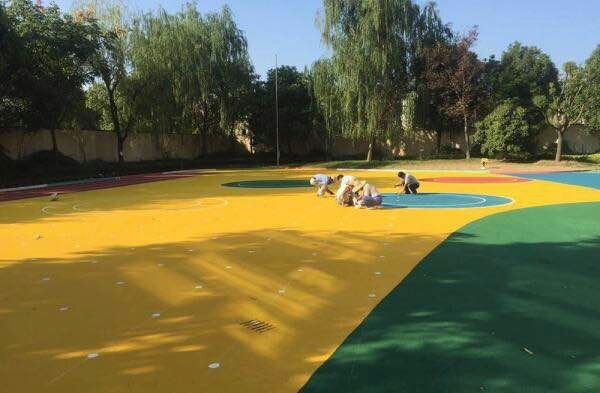Many kindergarten and primary school students in Jiangsu and other provinces have fallen ill after playing on newly-built rubber playgrounds at schools, while many such playgrounds have also been found to contain excessive levels of hazardous volatile organic compound and heavy metals. These were the findings of Southern Weekly, an influential liberal newspaper regarded as a model of watchdog journalism.
One of these cases cropped up in Shanghai. Fei Fei is a student in a branch school of the First Kindergarten of Pujiang District in Shanghai. According to his father, Wang Jian, Fei Fei got a cough after returning to school on 8th October. Wang Jian thought that maybe Fei Fei just caught a cold. However, the number of children getting sick rose quickly after National Day Holiday. In one class, 19 students had symptoms such as dizziness, fever, cough, or rash.
“Parents talked to each other and found that many children had similar symptoms. We started to notice the disgusting smell of the rubber playgrounds at the school,” Wang Jian said. “Under great pressure from students’ parents, the officers of the kindergarten had to send samples of the playground to the Synthetic Material Testing Center of East China University of Science & Technology.”
The test result indicated that one of the two samples contains excessive levels of lead. The kindergarten leader said that they would clear away the rubber playground by 20th November.
According to “The Research of The Rubberized Playgrounds’ Effect on Human Body”, an academic paper written by Li Yanxia, heavy metals contained in rubber playgrounds can pollute the environment and do harm to humans. For example, the lead can float in the air and gather at a height of 1 metre above the ground, while the paper also mentioned that children are more sensitive to air pollution.
Gu Longjun, a doctor in Shanghai Children’s Medical Center’s hematology department, told a reporter for Shanghai based video news portal Kankan News, “Symptoms like dizziness, fever, cough or rash are usually caused by benzene, methylbenzene, and dimethylbenzene, while the heavy metals like lead can lead to chronic disease. It seems that the students of the First Kindergarten of Pujiang District in Shanghai were affected by benzene, methylbenzene, and dimethylbenzene.”
In 2003, a similar accident involving a so-called “poisonous” playground raised heated discussion about the safety of rubberised playgrounds. Although many professors suggest that the factories use additives such as ethyl acetate and aceton to replace benzene, methylbenzene, and dimethylbenzene during construction, many did not make any change because the chemical carcinogen materials are less expensive.
On 21st November, the Education Department of Jiangsu Province issued a notification on rubber playgrounds in schools in which it declared that the factories that built the “poisonous” playgrounds are primarily responsible for them, while it was also noted that some factories used fake quality qualification reports and harmful materials during construction.
In recent years, the rubber playground has become increasingly popular with its many advantages. It can make sports safer for students by reducing injuries and can quickly dry after rain. In China, it has become an important indicator of school’s education performance assessment.
“Schools in Jiangsu Province have built 552 rubber playgrounds from 2012 to 2015. 113 rubberised playgrounds are under construction,” the notification issued by Education Department of Jiangsu Province said. However, according to live sports broadcaster Tencent Sports, “poisonous” rubber playgrounds have embarrassed many schools recently.
“When we tried to ask for help from the local government, we found that the administrative departments tended to pass the buck because there is no specific rule telling who should be responsible for the quality of rubber playground. So I think that maybe the first step to avoid this kind of problem is to define clear responsibilities,” Wang Jian concluded.









